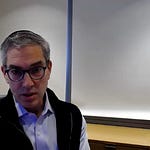The Bible Doesn’t Grant Jews Unconditional Sovereignty Over the West Bank
Last Tuesday, Knopf published my new book, Being Jewish After the Destruction of Gaza.
You’ll find a list of book-related events, interviews and reviews below.
As I’ve mentioned before, I hope people who buy my book also buy one by a Palestinian author (for instance, Palestinian Identity: The Construction of Modern National Consciousness by last week’s Zoom guest, Rashid Khalidi). I hope they also donate to a charity working in Gaza.
Our guest for this Friday’s zoom call will be the eminent historian Deborah Dash Moore, who is Jonathan Freedman Distinguished University Professor of History and Professor of Judaic Studies at the University of Michigan. She’s been studying a number of surveys of American Jewish opinion, including this one, which suggest that the American Jewish establishment’s claim that an overwhelming percentage of American Jews support the concept of a Jewish state—even if it denies Palestinians’ basic rights—is wrong. We’ll discuss that data, and what it says about larger historical trends among American Jews.
Friday’s zoom call is for paid subscribers.
Book Tour
(We’ll update this every week.)
On Tuesday, February 4, I’ll be speaking at the Newmark School of Journalism at CUNY with my brilliant colleague, Alia Malek.
On Wednesday, February 5, I’ll be speaking online to “Reconstructionists Expanding Our Conversation on Israel/Palestine.”
On Saturday night, February 8, I’ll be speaking with Ta-Nehisi Coates at the First Presbyterian Church of Brooklyn. When Beinart Notebook subscribers register, they can use the code at the bottom to receive a free ticket.
On Monday, February 17, I’ll be speaking at San Diego State University.
On Tuesday, February 18, I’ll be speaking with UCLA historian David Myers at the Lumiere Music Hall in Los Angeles.
On Monday, February 24, I’ll be speaking with Washington Post columnist Karen Attiah at Politics and Prose bookstore in Washington, DC.
On Monday, March 3, I’ll be speaking with Professor Atalia Omer at Notre Dame University.
On Tuesday, March 18, I’ll be debating an old classmate, Michael Rubin of the American Enterprise Institute, on the proposition “The oppression of Palestinians in non-democratic Israel has been systematic and profound” at the Soho Forum in New York.
On Monday, March 24, I’ll be speaking at the University of Vermont.
On Tuesday, March 25, I’ll be speaking at Middlebury College.
On Wednesday, April 9, I’ll be speaking at United Parish in Brookline, Massachusetts.
Book Interviews
Last week, I spoke about Being Jewish After the Destruction of Gaza on MSNBC’s Morning Joe, CNN’s Fareed Zakaria, NPR’s Morning Edition, WNYC’s Brian Lehrer, Pod Save the World, Breaking Points, Robert Wright’s Substack podcast, Marc Lamont Hill’s “Office Hours,” Speaking Out of Place and For the Sake of Argument.
I did print interviews with The Guardian, Religion News Service and Columbia Journalism Review.
The book was reviewed (I include negative as well as positive reviews!) by Prospect Magazine, Counterpunch and The Jerusalem Post.
Sources Cited in this Week’s Video
Rabbi Yaakov Shapiro’s book, The Empty Wagon.
Things to Read
(Maybe this should be obvious, but I link to articles and videos I find provocative and significant, not necessarily ones I entirely agree with.)
In Jewish Currents (subscribe!), Arthur Asseraf asks what people committed to Palestinian freedom should learn, and not learn, from decolonization in Algeria.
In The Third Narrative, Ralph Seliger critiques my, and Rashid Khalidi’s, visions for a future Israel-Palestine.
Why the documentary “No Other Land” can’t find a US distributor.
See you on Friday, January 31,
Peter
TRANSCRIPT
Hi. So, Donald Trump’s ambassador to the United Nations, Elise Stefanik, said in her Senate confirmation testimony that she believes that Israel has a biblical right to the West Bank. Now, as a statement in American public discourse, this is an absurd statement, right. America should not be making public policy based on appeals to sacred texts that are sacred to some people but not others, right. We have a framework of international law, which determines whether Israel has the right to control the West Bank, and also we should be thinking in terms of basic questions of human rights and what it means for Israel to control that territory in terms of the rights of all of the people—most of whom are Palestinian—who live in that area.
But I also think it’s worth noting that Stefanik’s understanding of the Bible, as I understand it, is completely wrong from the perspective of Jewish tradition. Which is to say the Jewish tradition, at least as I understand, does not grant Jews unconditional political control over the West Bank or any other part of what we call Eretz Israel, the land of Israel. And I think one of the writers who make this point most clearly is Rabbi Yaakov Shapiro, who’s written this book called The Empty Wagon. It’s quite a remarkable book. Not an easy book. It’s 1,400 pages; much of it kind of citing dense citations of Jewish texts and rabbinic authorities. But one of the points that Shapiro makes that I think is really significant is this distinction between the way Jewish tradition thinks about the holiness of the land, and the question of political sovereignty over the land—certainly unconditional political sovereignty.
So, Shapiro writes: ‘Eretz Israel is not a state at all.’ He’s talking within the perspective of Jewish tradition. ‘It is an area of land, its borders demarcated by the parameters of its holiness, not by political sovereignty. If the Romans own Eretz Israel, then one acquires the mitzvah of living in Eretz Israel by moving to that part of the Roman Empire. Today, southern Lebanon is Eretz Israel. Someone living in some Arab town in southern Lebanon is thus basking in all the holiness of Eretz Israel.’ Because he’s making the point that the biblical borders of Eretz Israel are not the same as the borders of the contemporary state of Israel.
His point is that the land has a particular holiness because there are certain religious commandments, certainly mitzvot, that can only be performed in the land of Israel, especially agricultural mitzvot. And so, anyone who’s living in that land has access to a greater kind of holiness because there are commandments they can fulfill there that they can’t fulfill somewhere else. But that’s true if the land is controlled by the Romans or if it’s in southern Lebanon. It doesn’t matter whether there is a Jewish state there.
Now, of course, the Bible does tell the story of Jewish kingdoms in part or all of the land of Israel. But then Shapiro also goes on to make the point that even according to Jewish tradition, when Jews do have sovereignty over all or part of this land, it’s never unconditional. It’s always conditional on whether they are fulfilling these obligations, right. And indeed, when they don’t fulfill these obligations, the Bible repeatedly tells the story of Jews being exiled from the land.
So, he quotes the great 19th century German Orthodox Rabbi Samson Raphael Hirsch as saying: ‘the gifts of a land and statehood are not an end in and of itself, but solely a means for carrying out the Torah. Whether or not Israel would possess and retain its land, therefore, depended on whether or not it would fulfill the demands of the Torah.’ And Shapiro also offers a couple of sourced citations from the book of Leviticus, one of which God says: ‘the land belongs to me. You are strangers and settlers in it with me,’ right. That the only true unconditional owner of the land is God and Jews have sovereignty over the land to the degree that they fulfill their obligations, right. And if not, they lose sovereignty over the land. He also quotes this famous line from Leviticus where God says: ‘and do not let the land vomit you out for defiling it as it vomited out the nations that were before you.’
So, the point is, first of all, that the holiness of land is separate from the question of political sovereignty, and that political sovereignty to the extent that Jews have it or anybody else has it, again in Jewish tradition is conditional, not unconditional, right, with the ultimate owner being God, and God determining whether Jews or any other group of people deserve the right to have that political sovereignty based on how they behave. And in the case of Jews, whether they’re living up to Jewish religious commandments. Now, again, those religious commandments are complicated. Many of them might seem obscure. But surely, given the centrality of human dignity in Jewish tradition, one would have to think that the question of how you treat the dignity of the people in the land is one important condition in terms of your right to sovereignty, right.
And this is what Stefanik—with her crudely racist view of Palestinians and, frankly, deep ignorance of Jewish tradition—completely misses, right. When she says that the Bible is basically a grant of unconditional political sovereignty over the land of Israel to Jews. It’s an absurd argument in a secular political context, and in a very dangerous one. But it’s also an absurd argument in Jewish tradition, which I think is worth noting as well.
Free Ticket/Discount Code
Beinart Notebook paid subscribers will see a code below for a free ticket for the February 8 event with Ta-Nehisi Coates:
Listen to this episode with a 7-day free trial
Subscribe to The Beinart Notebook to listen to this post and get 7 days of free access to the full post archives.








